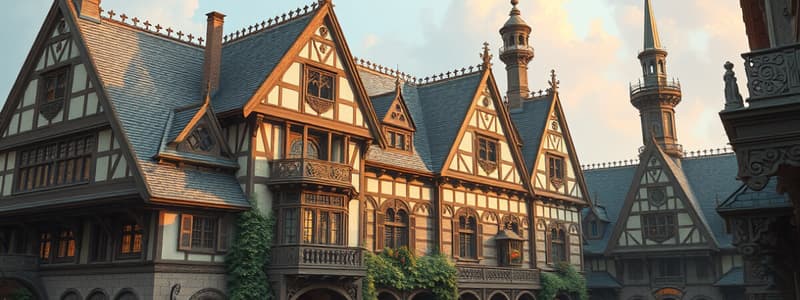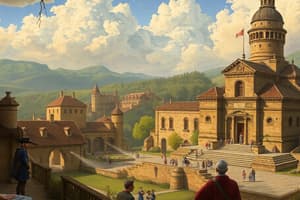Podcast
Questions and Answers
Who was the prominent Italian painter recognized at the conclusion of the 13th century?
Who was the prominent Italian painter recognized at the conclusion of the 13th century?
- Bonaventura Berlinghieri
- Giotto
- Pietro Cavallini (correct)
- Duccio di Buoninsegna
Which artistic element is most represented in Giotto's Madonna Enthroned?
Which artistic element is most represented in Giotto's Madonna Enthroned?
- Heavily patterned drapery
- Slender and fragile figures
- Floating figures
- Statuesque figures that cast shadows (correct)
Historian Giovanni Villani's phrase regarding a certain city-state as 'the daughter and creature of Rome' pertains to which location?
Historian Giovanni Villani's phrase regarding a certain city-state as 'the daughter and creature of Rome' pertains to which location?
- Padua
- Pisa
- Florence (correct)
- Siena
Which architect was responsible for the design of Florence's cathedral?
Which architect was responsible for the design of Florence's cathedral?
Which of the following cities gained prominence as a significant shipping force?
Which of the following cities gained prominence as a significant shipping force?
The imagery of the Triumph of Death primarily served as a caution against which of the following?
The imagery of the Triumph of Death primarily served as a caution against which of the following?
The humanist emphasis on fame primarily highlighted what aspect?
The humanist emphasis on fame primarily highlighted what aspect?
Which group was comprised mainly of laypeople who committed themselves to devout practices?
Which group was comprised mainly of laypeople who committed themselves to devout practices?
Which artistic technique involves the application of paint on freshly laid wet plaster?
Which artistic technique involves the application of paint on freshly laid wet plaster?
What term describes the architectural feature characterized by pointed arches and intricate designs often found in Gothic structures?
What term describes the architectural feature characterized by pointed arches and intricate designs often found in Gothic structures?
What represents the main philosophical movement that emphasized human potential and achievements during the late medieval period in Italy?
What represents the main philosophical movement that emphasized human potential and achievements during the late medieval period in Italy?
Which of the following best describes the style of Berlinghieri’s Saint Francis Altarpiece?
Which of the following best describes the style of Berlinghieri’s Saint Francis Altarpiece?
Which event in medieval Italy is characterized by the schism in the Catholic Church that led to rival popes?
Which event in medieval Italy is characterized by the schism in the Catholic Church that led to rival popes?
Which material or method is associated with the decoration of walls and ceilings with detailed artwork during the late medieval period?
Which material or method is associated with the decoration of walls and ceilings with detailed artwork during the late medieval period?
In the context of medieval Italian city-states, what was a primary purpose of guilds?
In the context of medieval Italian city-states, what was a primary purpose of guilds?
Which element found on the pulpit for the baptistery of Pisa Cathedral suggests a medieval architectural influence?
Which element found on the pulpit for the baptistery of Pisa Cathedral suggests a medieval architectural influence?
Flashcards are hidden until you start studying
Study Notes
Humanism and Cultural Context
- Humanism prioritizes human values over divine matters, emphasizing rational solutions to human issues.
- The resurgence of classical art in Italy was significantly tied to the court of Frederick II.
Natural Disasters and Their Impact
- The Black Death, which began in the 1340s, was the most devastating natural disaster in Europe during the medieval period.
Key Locations and Historical Significance
- Rome is recognized as the rightful capital of the Roman Catholic Church, maintaining ecclesiastical authority.
Artistic Styles and Influences
- Berlinghieri’s Saint Francis Altarpiece exhibits fundamentally medieval characteristics like frontality and stiff poses.
- Giovanni Pisano's work reflects a departure from traditional Byzantine styles, embracing French Gothic influences.
Prominent Artists and Their Contributions
- Pietro Cavallini was the leading Roman painter at the end of the 13th century, influencing subsequent artists.
- Giotto introduced statuesque figures casting shadows in the Madonna Enthroned, marking a shift in artistic representation.
City-States and Their Relations
- Florence, referred to as “the daughter and creature of Rome” by historian Giovanni Villani, was a significant city-state due to its heritage from the Roman Empire.
- Pisa established itself as a major maritime power, enhancing its economic standing during the medieval period.
Architectural Notions
- The architect Arnolfo di Cambio was responsible for the design of the Florence Cathedral, showcasing innovative gothic elements.
Social and Religious Developments
- Confraternities comprised laypeople who engaged in strict religious practices, reflecting the era's devotion.
- The humanist cult of fame emphasized the significance of creative individuals and their contributions to society.
Artistic Techniques and Themes
- The Triumph of Death serves as a metaphorical warning against the vices of lust and greed.
- Giotto sought to harmonize the illusion of three-dimensional forms with the spaces surrounding them, revolutionizing perspective in art.
Noteworthy Artistic Movements
- Simone Martini played a pivotal role in the development of the International Gothic style, blending courtly elegance with religious themes.
- Mendicant orders, distinct from other monastic groups, actively engaged in urban preaching and community outreach.
Studying That Suits You
Use AI to generate personalized quizzes and flashcards to suit your learning preferences.



